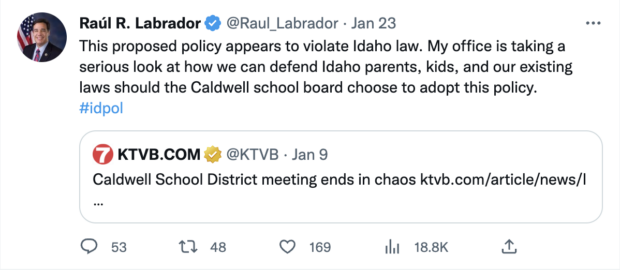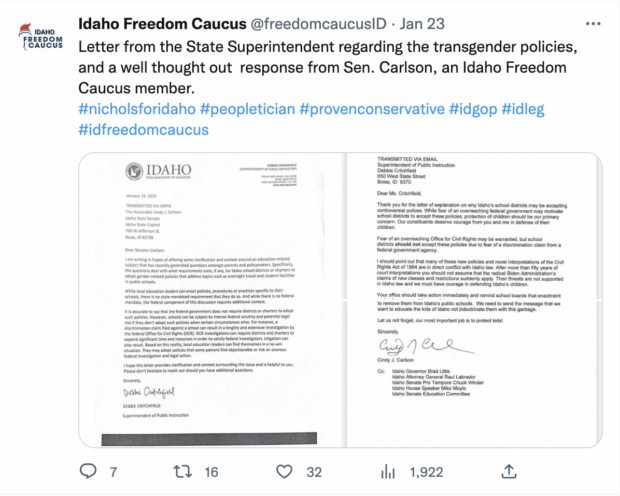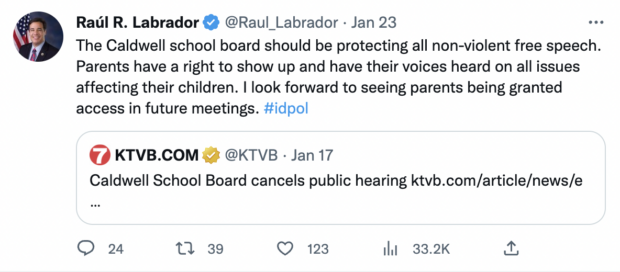Idaho Attorney General Raul Labrador this week questioned the legality of what he called a “dangerous” and “suspect” LGBTQ+ rights policy that’s already in place at about a third of Idaho’s school districts and charters.
That policy came into the limelight when attendees at a Jan. 9 Caldwell School Board meeting yelled at, insulted, and threatened board members over the draft of a potential policy, which would establish rights and protections for all students, regardless of sexual orientation. Trustees were forced to call the meeting to an early end.
On Monday, Labrador chimed in on the discord on Twitter: “This proposed policy appears to violate Idaho law. My office is taking a serious look at how we can defend Idaho parents, kids, and our existing laws should the Caldwell school board choose to adopt this policy.” Labrador further detailed his concerns in a Wednesday letter to Misty Swanson, the executive director of the Idaho School Boards Association.

If adopted, Caldwell’s draft policy would:
- Allow students to use bathrooms and locker rooms aligning with their gender identity.
- Protect students from being denied participation in overnight trips due to their sexual orientation.
- Require district staff to use a student’s preferred name and pronouns.
- Protect students’ privacy in regards to personal information, such as sexual orientation and legal name.
- Protect the rights of same-sex couples to attend school activities, including dances, and prohibit general discrimination against those couples.
Caldwell’s draft policy originated from an Idaho School Boards Association model policy. ISBA works with lawyers and staff members to create model policies that districts and charters may use and tailor to their individual needs.
Quinn Perry, the deputy director for ISBA, estimates that about 60 local education agencies or LEAs (which includes traditional school districts and charters) already have the LGBTQ+ policy in place. Perry pointed out that, in districts where students can use bathrooms and lockers rooms that align with their gender identity, accommodations can be made for other students who may be uncomfortable with that.
On Tuesday, Perry said she had no reason to believe the policy is violating any current Idaho law and reiterated that ISBA’s model policies are vetted by an attorney.
Labrador’s office at first gave no comment when asked for details on how the policies violate Idaho law or on the implications of Labrador’s Tweets for LEAs where such policies are already in place.
“We won’t comment on the specific laws implicated at this time because we don’t litigate in the press,” Emily Kleinworth, the public information specialist for the Attorney General’s office, wrote in an email Wednesday morning.
However, a few hours later, Labrador’s office sent EdNews a letter that he wrote to Swanson.
“I … find it unsettling — and inconsistent with your stated values — that the ISBA would advocate a dangerous policy that actively disenfranchises parents and families, the cornerstone of any schooling system,” Labrador wrote in the letter.
Labrador also cited Idaho Code 67-1041, which lays out the duties of an attorney general.
“As Idaho’s Attorney General, it is my job to protect the rights of Idaho residents and safeguard the legal interests of the State,” Labrador wrote. “I have serious concerns that Policy 3281 conflicts with state law, infringes on the fundamental rights of Idaho parents to direct their children’s upbringing and education, and violates educators’ first Amendment rights. I also worry that the policy will endanger students …”
Labrador listed a number of specific concerns, including that the policy would:
- “Allow biological boys to use girls’ locker rooms and bathrooms”
- “Force teachers to use pronouns that don’t correspond to students’ biological sex” and
- “Require school employees to conceal students’ intimate choices about sex and gender — along with potential gender dysphoria — from their parents.”
Labrador also admonished the ISBA for any role it may have played in providing legal advice to the Caldwell school board regarding the policy.
“Navigating the important, delicate state-federal balance of power and authority is something a nonprofit organization should refrain from doing,” he said.
Swanson was not immediately available to comment on the letter. EdNews will update the story if Swanson or ISBA provides further comment.
Republican Sen. Cindy Carlson calls LGBTQ+ rights policies “garbage”
State Superintendent Debbie Critchfield and Sen. Cindy Carlson, R- Riggins, have weighed in on the policy as well.
On Monday, the Idaho Freedom Caucus posted photos of letter correspondence between the two on its Twitter page.

In an emailed letter dated Jan. 19, Critchfield wrote to Carlson to offer “some clarification and context” about whether Idaho LEAs are required “to adopt gender-related policies that address topics such as overnight travel and student facilities in schools.”
There are no federal or state mandates that require schools to adopt such policies, but local education leaders may opt to do so, Critchfield wrote.
However, LEAs are also subject to “intense federal scrutiny and potential legal risk” if they don’t have such policies in place.
“Based on this reality, local education leaders can find themselves in a no-win situation,” Critchfield wrote. “They may adopt policies that some patrons find objectionable or risk an onerous federal investigation and legal action.”
In 2021, the U.S. Department of Education’s Office of Civil Rights (OCR) confirmed that Title IX protects students from discrimination based on sexual orientation and gender identity and explained it will enforce Title IX.
In a Jan. 23 response, Carlson wrote that “school districts should not accept these policies due to fear of a discrimination claim from a federal government agency.”
According to the Office for Civil Rights, “LGBTQ+ students often face additional challenges in schools, including disproportionately experiencing persistent bullying, harassment, and victimization.”
“The Department of Education strives to provide schools with the support they need to create learning environments that enable all students to succeed, regardless of their gender identity or sexual orientation,” Acting Assistant Secretary for Civil Rights Suzanne B. Goldberg said in a June 2021 press release. “As part of our mission to protect all students’ civil rights, it is essential that OCR acts to eliminate discrimination that targets LGBTQ+ students.”
Carlson urged Critchfield to “take action immediately and remind school boards that enactment and enforcement of these policies may subject them to criminal charges under Idaho law.”
Carlson then cited indecent exposure and child abuse laws.
Carlson CC’d Gov. Brad Little, Labrador, Sen. Chuck Winder, Rep. Mike Moyle and the Idaho Senate Education Committee, and called for all to “come together and take a stand against these controversial policies” and protect Idaho’s kids.
“We want to send the message that we want to educate the kids of Idaho not indoctrinate them with this garbage,” Carlson wrote.
The same day, Labrador took to Twitter with his comments on Caldwell’s proposed policy.
LGBTQ policies already in place can vary, but some mirror Caldwell’s draft proposal
EdNews searched the policies at some of the state’s largest districts and charters, and found a handful where a similar policy to Caldwell’s draft proposal is in place. Those LEAs and links to their policies are listed below:
- Bonneville School District: Read the policy here
- Twin Falls School District: Read the policy here on page 82
- Idaho Virtual Academy: Read the policy here on page 164
- Idaho Arts Charter: Read a policy on name/gender changes here and a policy and and policy on transgender and gender nonconforming students here
- Sage International: Read the policy here on page 94
In some cases, the policies that are already on record are very similar to Caldwell’s draft policy. That’s the case for the policies in place at Twin Falls School District, the Idaho Virtual Academy, the Idaho Arts Charter, and Sage International.
But in other cases, the policy is notably different.
Bonneville’s policy, for example, requires students to use restrooms/dressing rooms according to “official records,” unless a student has a doctor’s note “verifying the student is taking a medically prescribed hormone treatment under a physician’s care for the purpose of gender transition.”
In terms of overnight trips, students are “assigned sleeping rooms pursuant to the sex assigned to the student in their official school records.” However, the policy allows for accommodations for students if parents request them.
Bonneville’s policy does not require staff to use a student’s preferred name and pronouns whenever possible, as do versions of the policy at other LEAs.
What’s next for Caldwell? Labrador pushes for another public meeting.
After its Jan. 9 board meeting was cut short, trustees also canceled a second hearing on the proposed LGBTQ+ student policy “after careful consideration and due to safety concerns.”
“The trustees will be working with the Caldwell Police Department to create a plan to ensure the safety of participants at all future meetings because the safety of our students, parents, patrons, and staff is of utmost importance,” the district said in a statement posted on its website.
At this time, it’s unclear when or whether another public hearing might be held.
On Monday, Labrador seemed to push for another public meeting in a second Tweet on the policy: “The Caldwell school board should be protecting all non-violent free speech. Parents have a right to show up and have their voices heard on all issues affecting their children. I look forward to seeing parents being granted access in future meetings.”

